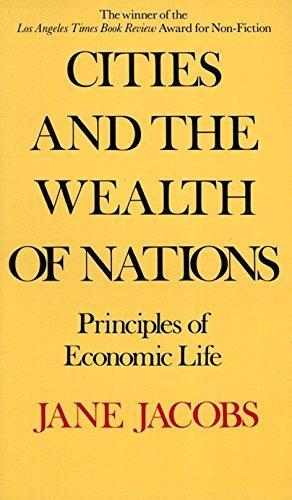Jane Jacobs (née Butzner; May 4, 1916 – April 25, 2006) was an American-Canadian journalist, author, theorist, and activist who influenced urban studies, sociology, and economics. Her book, The Death and Life of Great American Cities (1961), argued that "urban renewal" and "slum clearance" did not respect the needs of city-dwellers.Jacobs organized grassroots efforts to protect neighborhoods from "urban renewal" and "slum clearance", in particular, plans by Robert Moses to overhaul her own Greenwich Village neighborhood. She was instrumental in the eventual cancellation of the Lower Manhattan Expressway, which would have passed directly through an area of Manhattan that later became known as SoHo, as well as part of Little Italy and Chinatown. She was arrested in 1968 for inciting a crowd at a public hearing on that project. After moving to Toronto in 1968, she joined the opposition to the Spadina Expressway and the associated network of expressways in Toronto that were planned and under construction.As a woman and a writer who criticized experts in the male-dominated field of urban planning, Jacobs endured scorn from established figures. Routinely, she was described first as a housewife, as she did not have a college degree or any formal training in urban …
Jane Jacobs
Informacija apie autorių
- Gimęs:
- 1916 m. gegužės 4 d.
- Mirė:
- 2006 m. balandžio 25 d.
Išorinės nuorodos
Jane Jacobs (née Butzner; May 4, 1916 – April 25, 2006) was an American-Canadian journalist, author, theorist, and activist who influenced urban studies, sociology, and economics. Her book, The Death and Life of Great American Cities (1961), argued that "urban renewal" and "slum clearance" did not respect the needs of city-dwellers.Jacobs organized grassroots efforts to protect neighborhoods from "urban renewal" and "slum clearance", in particular, plans by Robert Moses to overhaul her own Greenwich Village neighborhood. She was instrumental in the eventual cancellation of the Lower Manhattan Expressway, which would have passed directly through an area of Manhattan that later became known as SoHo, as well as part of Little Italy and Chinatown. She was arrested in 1968 for inciting a crowd at a public hearing on that project. After moving to Toronto in 1968, she joined the opposition to the Spadina Expressway and the associated network of expressways in Toronto that were planned and under construction.As a woman and a writer who criticized experts in the male-dominated field of urban planning, Jacobs endured scorn from established figures. Routinely, she was described first as a housewife, as she did not have a college degree or any formal training in urban planning; as a result, her lack of credentials was seized upon as grounds for criticism, however, the influence of her concepts eventually was acknowledged by highly respected professionals.




